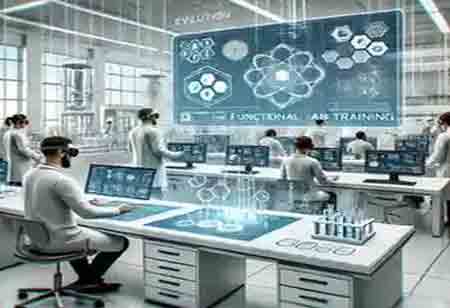Thank you for Subscribing to Healthcare Business Review Weekly Brief
Be first to read the latest tech news, Industry Leader's Insights, and CIO interviews of medium and large enterprises exclusively from Healthcare Business Review
Crafting Expertise: The Evolution of Functional Lab Training
The functional lab training industry is integral to developing skilled professionals across numerous high-tech sectors, including healthcare, biotechnology, pharmaceuticals, and environmental sciences.

By
Healthcare Business Review | Tuesday, April 22, 2025
Stay ahead of the industry with exclusive feature stories on the top companies, expert insights and the latest news delivered straight to your inbox. Subscribe today.
The functional lab training industry is integral to developing skilled professionals across numerous high-tech sectors, including healthcare, biotechnology, pharmaceuticals, and environmental sciences. As industries become increasingly complex and demand for specialized knowledge grows, the need for effective and efficient training solutions has never been greater. Functional lab training programs bridge the gap between theoretical education and practical expertise, equipping individuals with the skills to navigate sophisticated equipment and adhere to industry standards.
Current Market Trends Shaping the Functional Lab Training Industry
The functional lab training industry has experienced significant growth due to the increasing complexity of scientific and technological practices. As the healthcare industry evolves, a greater demand exists for specialized skill development. One of the main trends contributing to this growth is the incorporation of advanced technologies in training programs. Virtual simulations, augmented reality, and artificial intelligence transform traditional training methods, making them more immersive and interactive. These technologies enable trainees to simulate complex scenarios, practice troubleshooting, and gain familiarity with sophisticated lab equipment without the risks associated with real-world testing.
The growing emphasis on regulatory compliance and standardization across industries has heightened the need for robust training programs that align with international guidelines. With the increasing focus on quality assurance, safety, and precision, organizations invest heavily in lab training services to ensure their workforce is skilled and knowledgeable in meeting these requirements. Companies also incorporate data analytics to track training progress, identify gaps, and continuously improve their offerings. The convergence of technology and the demand for greater operational efficiency is thus reshaping the landscape of functional lab training services.
Key Challenges in the Functional Lab Training Sector and Their Solutions
Despite the significant strides made in functional lab training, organizations and institutions face several challenges. One of the primary challenges is the high cost of maintaining and updating state-of-the-art lab equipment for training purposes. With the rapid pace of technological advancements, laboratory equipment can quickly become obsolete, requiring frequent investments in new machinery and tools.
Many training centers are embracing virtual labs and digital platforms to address this. These solutions allow trainees to interact with equipment simulations and perform virtual experiments, thereby reducing the need for physical resources while offering a valuable learning experience.
Another challenge is the accessibility and scalability of training programs. In many instances, training can be limited by geographical location or the size of the facility, limiting the number of trainees who can participate. Remote learning tools and online modules are being developed to overcome these barriers.
By leveraging cloud-based platforms, functional lab training programs can reach a global audience, allowing trainees from various regions to participate in programs without traveling. This approach not only enhances accessibility but also increases the scalability of training programs, enabling organizations to train more professionals cost-effectively.
Ensuring the integration of industry-relevant knowledge into training programs remains a challenge. As industries evolve, the skills required to operate new equipment or follow new protocols often change. Traditional training programs may struggle to keep pace with these shifts, leading to a professional skills gap.
Training service providers are increasingly collaborating with industry experts and research institutions to develop continuously updated curricula to reflect the latest trends and technological innovations. This collaboration ensures that trainees are exposed to current practices and are provided with the tools needed to succeed in a rapidly transforming environment.
Advancements and Opportunities in Functional Lab Training for Stakeholders
Functional lab training services present numerous opportunities for stakeholders, from training providers to industry professionals, to benefit from technological advancements and pedagogy. One of the primary opportunities is the expansion of specialized training modules for niche industries. As industries diversify and new sectors emerge, the need for specialized training is growing.
For instance, there is an increasing demand for training in advanced genetic engineering techniques or laboratory automation systems in biotechnology. Industries like renewable energy and environmental science are creating new pathways for training professionals who can operate cutting-edge equipment in these fields.
A significant opportunity exists in the development of personalized and adaptive learning technologies. With the help of data analytics, training providers can build individualized learning paths that cater to trainees' specific needs and learning speeds. This approach ensures that professionals receive targeted instruction based on their knowledge and skillset, leading to better retention and application of training content.
With the integration of AI-driven tools, training services can be tailored in real-time, providing immediate feedback and adjusting the difficulty of exercises as needed. This flexibility and personalization increase the overall effectiveness of training programs, ultimately benefiting organizations that seek to optimize their workforce's performance.
The increasing reliance on remote training and virtual environments presents an opportunity to broaden the scope of functional lab training services. Online and hybrid training models enable professionals to access content from anywhere and at their own pace. This accessibility makes functional lab training more inclusive and equitable, allowing professionals from underrepresented regions or backgrounds to gain the expertise necessary to advance in their careers. Remote training options make it possible to offer programs at lower costs, as the need for physical infrastructure and travel expenses is significantly reduced.






